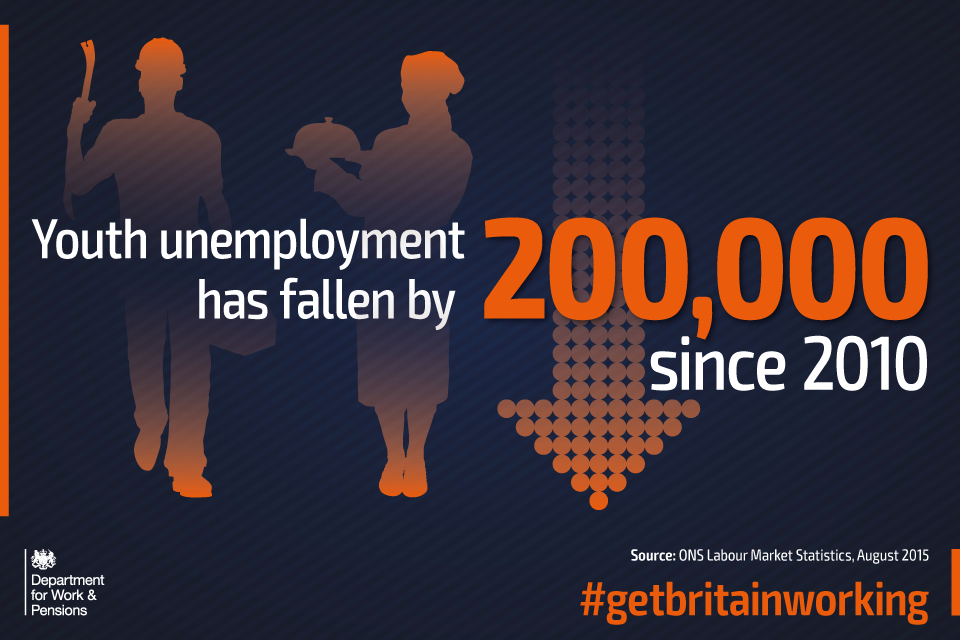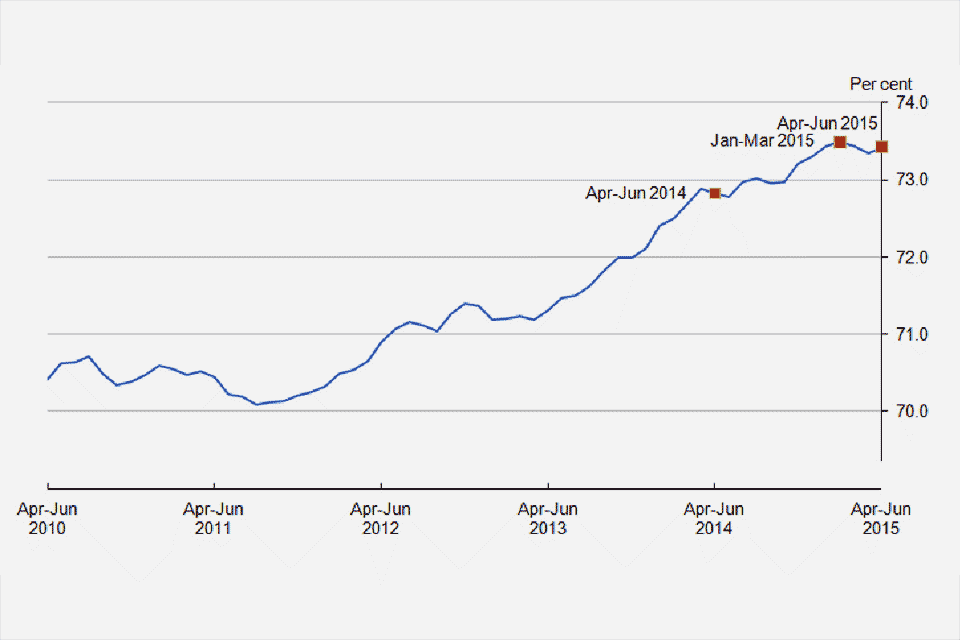Iain Duncan Smith: Wage rises show one nation government helping hardworking people
Wages have continued to rise and there are a record number of women in work, thanks to the government’s long-term economic plan.

Department for Work and Pensions
Average pay growth (excluding bonuses) is at 2.8%, meaning hardworking people have more money in their pockets, as the UK economy continues to recover.

Youth unemployment has fallen by 200,000 since 2010
There are now a record 14 million women in work, showing that this one nation government is delivering on the commitment to ensuring the economic recovery is felt by all sections of society.
In a further sign of the strength of the UK labour market, there are 354,000 more people in work than a year ago, with the vast majority of the rise in employment coming from full-time work.
Figure 1: UK Employment rate (aged 16 to 64), seasonally adjusted

Figure 1: UK employment rate (aged 16 to 64), seasonally adjusted
Work and Pensions Secretary Iain Duncan Smith said:
Thanks to our long term economic plan we have already seen 2 million more people in jobs since 2010. On top of that, today’s figures show job vacancies at a near record high – evidence of the continued confidence of British businesses, and potential for further growth in the UK economy.
Our one nation government is helping millions across the country to succeed and achieve their full potential. I was particularly pleased to see that wages are continuing to rise – meaning that hardworking people will see a real difference in their pay packets.
Today’s figures coincide with the launch of the new #WEcan work experience campaign – which is designed to ensure that even more young people have the opportunity to gain valuable and practical business skills for that first step on the career ladder.
The new ‘WE can’ campaign aims to support young people to take up work experience opportunities and encourage businesses to create them, with 84 Youth Ambassadors leading activities across the country.
It is being launched ahead of GCSE and A-Level results being released and will be supported by up to 12,000 young people who are part of the Youth Employment UK network.
Figure 2: UK Claimant Count, seasonally adjusted

Figure 2: UK claimant count, seasonally adjusted
Other key employment statistics today show:
- there are nearly 2 million more people in work than in 2010
- nearly half a million more people are in jobs in the private sector over the last year alone
- unemployment has also fallen by 221,000 in the last year
- long-term unemployment has fallen by more than 210,000 since 2010
- there are 735,000 vacancies – an increase of nearly 70,000 since last year
- the claimant count has fallen by more than by more than 200,000 in the last year
Women
Female employment is at a record number, 14.54 million, and a joint record employment rate at 68.7%. Employment rose 180,000 in the past year. Female economic inactivity has also fallen to a record low.
Young people
Youth unemployment has fallen by 38,000 in the past year and has fallen by 200,000 since 2010.
The number of young people claiming unemployment benefits is close to the lowest level since the 1970s.
The percentage of young people under the age of 25 that have left full time education and are unemployed is down by over a third since from its peak in the recession.
International
The UK’s employment rate has seen the largest rise of any G7 economy over the last year.
Vacancies
The number of vacancies rose by almost 70,000 over the past year. There are now 735,000 vacancies in the economy at any one time, which is more than before the recession.
Supporting people into work
The Department for Work and Pensions (DWP) offers a range of support across the country to get people off benefits and into jobs through our network of over 700 jobcentres.
These include work experience, employer-led training, work placements, skills training, the Work Programme, and help for budding entrepreneurs through the New Enterprise Allowance.
DWP has also introduced the claimant commitment in all British jobcentres – it is a more rigorous commitment for benefit claimants based on the person’s individual circumstances and clearly sets out what their responsibilities are while job hunting. Latest figures show that more than a million jobseekers have now signed the commitment.
More information
Read the Labour Market Statistics – August 2015 from the Office for National Statistics.
We’ve also published new official statistics today showing the latest number of claims to Universal Credit.
Contact Press Office
Media enquiries for this press release – 0203 267 5122
Press Office
Caxton House
Tothill Street
London
SW1H 9NA
Telephone: 0115 965 8781
Follow DWP on:
- Twitter – www.twitter.com/dwppressoffice
- Facebook – www.facebook.com/dwp
- LinkedIn – www.linkedin.com/company/dwp
- YouTube – www.youtube.com/dwp